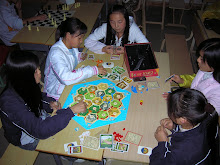
Today I wandered around the room, proctoring the make-up examination (the second exam) for the 5-year students. I would describe them as students who struggle to learn English, but the fact is that they have great difficulties with school. Struggle implies effort put forth to do something and these students are devious and lazy.
The 9 students slowly wrote answers to the questions and used body language that was all too familiar: something was wrong. I looked around the room. Then I walked around the room once. I sat back down at the front. Something was definitely wrong.
I was immediately upset because I knew this would involve a new level of surveillance. I was going to have to work to ensure this test was administered fairly.
The first student was obvious. She was doing a classic cheat that involves cheat-notes on the lap. I could see her eyes shifting slightly from her paper to her lap. I pretended not to notice as she looked up at me. I shifted in my seat. I took interest in someone across the room, waiting for a moment to slide over and see what was going on. Finally I turned and walked quickly to her desk. She was too late – I took two pieces of paper from inside her desk that contained several of the test answers.

This was, of course, the opening to an hour of continued crackdowns on this illicit practice. The second student was far more resourceful. She used a 1.5 x 2.5 inch card (front and back) that contained several answers to the test. This card was hidden between test sheets to avoid getting caught as I wandered around and checked their desks and laps. I turned her page to see if she was almost done with the test and there it was. An accident on my part that led to catching a cheater.

I wouldn’t have caught the next 5 students if I hadn’t seen more suspicious behavior on the part of several students. The way the test is structured, one either knows the answer or not. It does not come down to a slow process of answering questions one-by-one until finished: this test is quickly done if it is done at all. Several students were about halfway done, having completed every answer prior to the one on which they were working. Then it was clear: the students were getting the answers from another source. I cautiously checked their hands by walking around the room and looking from different angles, but there was nothing there. Sleeves were ruled out as well. Then I noticed a strange behavior. One student was using a large eraser to remove small scuffmarks from his desk. When I examined more closely I could see vague smudges of answers to the test. I checked each student and found 3 more doing the same thing. Then I investigated the desk of a girl who had completed the exam and left several minutes before: vague remnants of penned answers covered the place where her test would have been. I marked her test with a large “C” for “Cheating.”
I felt tempted to admire their aptitude for cheating, but the sadness of what this means for them and their future is overwhelming. Besides, if I caught them they couldn’t be all THAT good.
Last semester, this class suffered a large percentage of failures due to absenteeism, cheating, final examination failure, or a combination of these. The test itself was not too difficult, nor was the class. The rate of failure was around 45%, an abnormally high number.
I wrote a letter to the English department that stated a need for Chinese instructors. This class was filled with students who had poor study habits, displayed inappropriate behavior, and often failed to come to class. A foreign teacher could not solve the problems because the students don’t speak English. After some deliberation and an ultimatum, the department decided to forgo assigning foreign teachers to this class.
This semester we don’t have this class, but the students who failed the exam came to me. They asked about the make-up exam, a common practice in Chinese higher education. I would give them a make-up exam, they would pass, and everyone would be happy. Unfortunately, things don’t work like that. Generally the make-up test is designed by the Chinese teachers to be passable by a monkey on roller skates. I think differently, and the difficulty of my test changed very little. Granted, the original test was easy enough.
Cost-benefit analysis of the tests reveals some startling evidence that, had I thought about it beforehand, explains much of the behavior I saw during the make-up exam. Of the students, 78% cheated on the second exam. At first this surprised me, but further review of the situation made things clear.
A student taking a test during the first round might be embarrassed if they are caught cheating. The student is more likely to avoid this and try for a passing score by studying. After all, it is only the first test.
Students who have already failed, however, see things much differently. They have been sufficiently embarrassed by failing the first test, and now they are in an environment surrounded by other students who feel the same way. The benefit of passing the exam by cheating far outweighs the risk of being caught.
How will this situation end? Will the students end up passing the exam anyway? Were there unspoken orders to pass these students no matter how low they scored on the make-up?
It’s hard to say what will happen. I will follow the situation closely in the coming weeks.








No comments:
Post a Comment